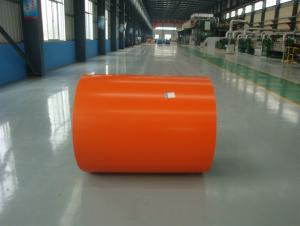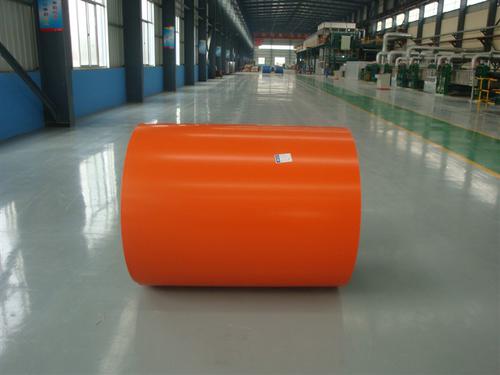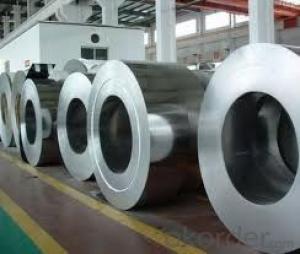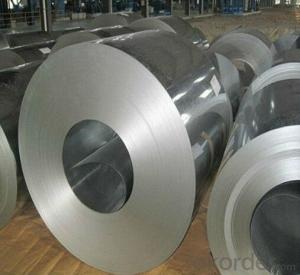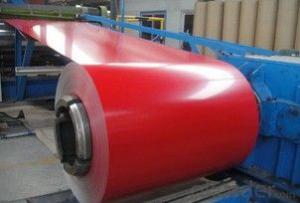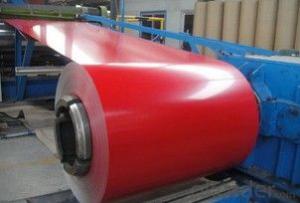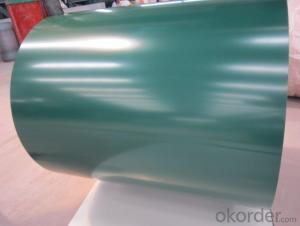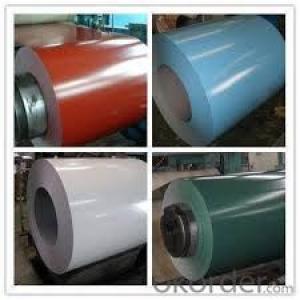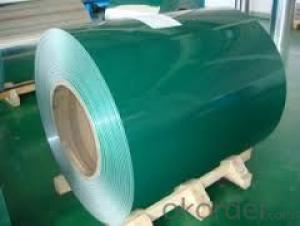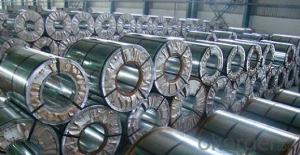PRE-PAINTED GALVANIZED STEEL COIL
- Loading Port:
- Tianjin
- Payment Terms:
- TT OR LC
- Min Order Qty:
- -
- Supply Capability:
- 8000 m.t./month
OKorder Service Pledge
Quality Product, Order Online Tracking, Timely Delivery
OKorder Financial Service
Credit Rating, Credit Services, Credit Purchasing
You Might Also Like
THICKNESS:0.18mm-1.5mm
WIDTH:900mm-1250mm
COATING MASS:Z30-Z275
PAINT:PE、HP、HDP、PVDF、SMP、MATT、PVDF
COLOR:RAL Scale
COIL INNER DIAMETER:508mm/610mm
COIL WEIGHT:3mt-7mt
BASE MATERIAL:Hot-dip GALVANIZED Steel
- Q: I've seen commuters that ride fixed gear and the traditional pista bike with gears. Now, as I saw on the bianchi website that you can mount front and rear brakes on the bianchi steel pista bike and I want to use it to ride to water polo and school.I've rode the ghetto fixed gear bike but it has gotten small for me. It was an aluminum bike. How strong is the steel? Is the frame strong enough to handle 150 lbs? Will the fork break easily if I ride over some cracks? Has anyone ridden the bianchi steel bike and the fork broke? HELP?Thanks.P.S. Please don't comment how I shouldn't use a pista bike on the road, if I can mount brakes then it can be used for road purposes.
- It will be fine as long as you don't use it for tricks.
- Q: i cant find this stuff about steel:conductivitystrengthcorrosion resistancecommon applicationsif you know of any interesting facts, i could use those 2!thanx!
- The strength and corrosion resistance depends on the mix. Pure steel is pure iron plus 6% pure carbon. It is the carbon molecules that give it a tough crystallized strength. Pure iron is wrought iron and you can bend that with your hands. Strength also depends on the shape of the beam the most common steel beam is the W flange more commonly called the I beam. That is because the strength of the ‘I’ beam is just a little bit less than if the entire I beam was filled in; however the weight and material savings is huge. Steel itself has no corrosion resistance and is often given a zinc coating just to resist oxidization. Manganese, vanadium and tungsten are just some of the other elements added to improve the steel.
- Q: What are the common challenges in steel coil manufacturing?
- There are several common challenges in steel coil manufacturing that manufacturers often face. One of the major challenges is maintaining consistent quality throughout the manufacturing process. Steel coils need to meet specific specifications and standards, and any deviation from these can lead to product defects or rejections. This requires careful monitoring and quality control measures at each stage of the manufacturing process. Another challenge is ensuring efficient production and minimizing downtime. Steel coil manufacturing involves several complex processes, including cutting, forming, welding, and finishing. Any issues or delays in these processes can result in production bottlenecks, which can impact the overall efficiency and productivity of the manufacturing facility. Additionally, handling and storage of steel coils can pose challenges. Steel coils are heavy and can be difficult to handle, requiring specialized equipment and proper training for workers. Moreover, proper storage conditions need to be maintained to prevent damage from moisture, corrosion, or other environmental factors. Maintaining a safe working environment is also a challenge in steel coil manufacturing. The equipment and machinery used in the manufacturing process can be hazardous if not operated and maintained properly. Ensuring the safety of workers and implementing appropriate safety protocols is crucial to prevent accidents and injuries. Lastly, fluctuating raw material costs and market demands can present challenges for steel coil manufacturers. The cost of raw materials, such as iron ore and scrap metal, can significantly impact the profitability of the manufacturing process. Additionally, market demands for specific types of steel coils may change, requiring manufacturers to adapt and adjust their production accordingly. In conclusion, common challenges in steel coil manufacturing include maintaining consistent quality, achieving efficient production, handling and storage issues, ensuring a safe working environment, and dealing with fluctuating raw material costs and market demands. Overcoming these challenges requires careful planning, continuous improvement, and effective management of resources and processes.
- Q: How are steel coils used in the manufacturing of exhaust systems?
- Steel coils are used in the manufacturing of exhaust systems as they are rolled into sheets and then formed into various components such as mufflers, pipes, and catalytic converters. These coils provide the necessary strength, durability, and corrosion resistance required for exhaust system components to withstand high temperatures and harsh conditions.
- Q: How are steel coils cut and shaped for specific requirements?
- Steel coils are cut and shaped for specific requirements through a process called slitting and forming. Slitting involves unwinding the coil and passing it through a set of circular blades that cut it into narrower strips. These strips can then be further processed through different forming techniques such as roll forming, stamping, or bending to achieve the desired shape and dimensions. This allows manufacturers to customize steel coils according to specific requirements for various applications in industries like automotive, construction, and manufacturing.
- Q: What are the different coil handling equipment options available for steel coils?
- For steel coils, there are various choices available for coil handling equipment, depending on the industry's specific needs and requirements. 1. Coil Cars: Used for transporting steel coils within a facility, coil cars come with hydraulic or mechanical lifting mechanisms to safely load and unload coils onto other equipment or storage racks. 2. Coil Upenders: Essential for loading and unloading coils onto coil cars or other machinery, coil upenders rotate steel coils from a horizontal to a vertical position, or vice versa. The operation can be manual or hydraulic, depending on coil weight and size. 3. Coil Lifters: Designed for safe lifting and transportation of steel coils, coil lifters have adjustable arms or hooks that securely grip the coil's inner diameter. Depending on the coil's weight and size, coil lifters can be operated using hydraulic, mechanical, or electromagnetic mechanisms. 4. Coil Turnstiles: Coil turnstiles efficiently store and retrieve steel coils in a vertical position. They can be rotated manually or automatically using hydraulic or mechanical systems, allowing for easy access and retrieval. 5. Coil Reels: Unwinding steel coils and feeding them into processing machinery, such as stamping presses or roll forming machines, is done using coil reels. Equipped with adjustable tension controls, coil reels ensure a smooth and consistent feed. They can be operated manually or automatically, depending on the required level of automation. 6. Coil Cradles: Providing support for steel coils during storage or transportation, coil cradles evenly distribute the weight of the coil, preventing deformation or damage. They can be stationary or equipped with wheels for easy movement. In summary, the range of coil handling equipment options available for steel coils offers efficient and safe solutions for handling, storage, and processing of these heavy and valuable materials. The choice of equipment depends on factors such as coil size, weight, production volume, and specific industry requirements.
- Q: What are the different methods of heat treatment for steel coils?
- There are several methods of heat treatment for steel coils, including annealing, quenching, tempering, normalizing, and stress relieving. Each method involves heating the steel to a specific temperature and then cooling it in a controlled manner to achieve desired properties such as increased hardness, improved strength, or reduced residual stresses. These methods can be tailored based on the specific requirements of the steel and the intended application.
- Q: What are the common industry standards for steel coils?
- The common industry standards for steel coils include specifications related to dimensions, weight, chemical composition, mechanical properties, and surface finish. These standards are often set by organizations such as the American Society for Testing and Materials (ASTM), International Organization for Standardization (ISO), and the Steel Industry Associations.
- Q: Can steel coils be coated with impact-resistant materials?
- Yes, steel coils can be coated with impact-resistant materials.
- Q: The length of a steel beam increases by 0.78 mm when its temperature is raised from 22 degrees C to 35 degrees C. What is the length of the beam at 22 degrees C (in meters)?I used: L = (0.78 mm)/[(9/5)(.00000645 F)(13)] = 5.17 meters but Mastering Physics said Not quite. Check through your calculations; you may have made a rounding error or used the wrong number of significant figures. I'm confused because this is how we learned this kind of problem in class, so if anybody knows what I did wrong, feel free to correct my errors! Thanks
- the welded joints,...are then sturdy steel, and conducts warmth very very right this moment, so develop from warmth often is the comparable because of fact the plate steel around it. you may desire to slope the backside and have a condensate seize gadget, steam secure practices stress alleviation valve, sized for the quantity and pressures, totally lag the vessel, adhere to ALL secure practices specs., (of your codes), which comprise the welding NDT. in the tank layout enable for the thermal develop of the vessel. cheers.
Send your message to us
PRE-PAINTED GALVANIZED STEEL COIL
- Loading Port:
- Tianjin
- Payment Terms:
- TT OR LC
- Min Order Qty:
- -
- Supply Capability:
- 8000 m.t./month
OKorder Service Pledge
Quality Product, Order Online Tracking, Timely Delivery
OKorder Financial Service
Credit Rating, Credit Services, Credit Purchasing
Similar products
Hot products
Hot Searches
Related keywords
